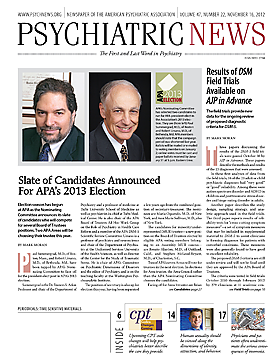I’ve always set high expectations for myself,” says psychiatrist Dionne Hart, M.D., chair of the AMA’s Minority Affairs Section.
And to hear her life story is to realize she means what she says. Growing up outside of Chicago, Hart had always wanted to be a doctor, but she married young to her high-school sweetheart, and by the time she was 20 she was divorced with three children at home but still managing to complete an undergraduate degree at the University of Chicago.
That might have been accomplishment enough for some people, but after she graduated with a degree in psychology, she began taking courses to prepare for medical school while working in a community mental health center (CMHC) on Chicago’s West Side. It was that experience that sparked an interest in psychiatry and in making changes to systems and policies that affect patients and their physicians.
“I always had an interest in listening to people’s stories,” she said. “And working in a CMHC I saw a lot of things that I knew needed improvement, and I wanted to make a change.”
She had completed two years at Rush Medical College when her father became ill. After taking time to care for him before his death in 1999 she returned to Rush and finished her schooling. After a psychiatry residency at the Mayo Clinic, Hart took a two-year commitment to treat underserved populations through the national Health Service Corps, as a way to defray medical school costs.
Today she works as a psychiatrist in the Federal Medical Center in Rochester, Minn., which provides medical and mental health treatment to male prison inmates.
Hart has brought the same determination to achieving her goals at the AMA. Last year, she was reelected to a two-year term as chair of the Minority Affairs Section, representing African-American, Hispanic, American Indian/Alaskan Native, and other minority physicians. She is one of several young psychiatrists who have energized the AMA with their commitment to organized medicine while building bridges between psychiatry and other medical specialties.
And along with an influx of young, diverse physicians from other disciplines, Hart and other young psychiatrists are helping transform the AMA.
She was introduced to the AMA as a resident when she became involved in the Minnesota Medical Association, serving as a delegate to the AMA Resident and Fellow Section. “I didn’t really know much about the AMA at the time,” she recalled. “I was familiar with the National Medical Association, the organization that has traditionally represented African-American and Hispanic physicians, and I think I thought that the AMA wasn’t a place for me. But I was surprised when I joined the residents section to find it was a pretty diverse group, and people were really interested in making a change.”
According to data compiled by Hart and her staff with the Minority Affairs Section, 74 percent of AMA delegates or alternate delegates are white non-Hispanic, 3.49 percent are black non-Hispanic, 1.9 percent are Hispanic, and 7.19 percent are Asian/Asian American.
Historical figures on racial and ethnic composition of the House of Delegates for comparison are unavailable, but it’s clear that the face of the AMA has changed. And in July 2009, it issued an official apology for a history of excluding black physicians from membership and failing to speak against federal funding of segregated hospitals and in favor of civil-rights legislation.
“The AMA failed, across the span of a century, to live up to the high standards that define the noble profession of medicine,” said AMA past President Ron Davis, M.D., in a commentary published in the July 16, 2009, Journal of the American Medical Association (JAMA). The apology came in response to an expert panel’s report on the historical racial divide in organized medicine titled “African-American Physicians and Organized Medicine, 1846–1968: Origins of a Racial Divide,” also published in JAMA.
Health Disparities Targeted
Hart says today the Minority Affairs Section is dedicated to addressing the health disparities between ethnic groups and to increasing the diversity of the physician workforce. And she believes those goals have the backing of the AMA’s leadership. “My perspective is that the AMA has been very open about previous challenges in its history, and now has made it a high priority to eliminate health care disparities,” she told Psychiatric News.
And she said that psychiatrists of all backgrounds who may think, as she once did, that the AMA is “not a place for me” should take a second look.
“Membership in the AMA is an opportunity to work with state organizations and other medical specialties to develop policies that can improve the life of our patients. There is strength in having the AMA behind you.”


